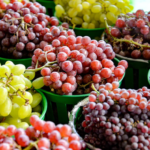South Africa looks to U.S. again for early grape exports
South African grape producers are setting their sights on exporting to the U.S. again by the end of the year, following the successful arrival of an irradiated test consignment treated before shipment to Newark.
Capespan trialed a container of Crimson seedless following the industry's success in February in gaining U.S. Department of Agriculture (USDA) approval for the Cape Town high energy processing center (HEPRO Cape) to sterilize insects.
Fisher Capespan commercial manager for North America Ron van Heerden, said the treatment would probably be just as good for other grape cultivars such as Thompson seedless.
"The process worked. The fruit arrived in sound quality. We are at the stage of doing our homework on the marketing side to see what demand is at the moment for South African grapes," he says.
"If we can start to do it early in the season, the early grape market from the South African perspective is very competitive."
The South African grape season starts as early as November in the Northern region and moves further south, finishing with the Western Cape at the late March-early April.
The USDA approved cold sterilization programe of 21 days several years back; a process which was too onerous for grape quality
For the last few years the South African Table Grape Industry (SATGI), Hortgro, post-harvest technology company Experico and HEPRO Cape have been working with U.S. to gain authorization for a nationally-based treatment center.
HEPRO Cape managing director Cherin Balt, said trials had been conducted on a range of different grapes in addition to Crimson seedless.
"By the time fruit leaves here any insects on the fruit have been sterilized at a very low dose, thus not affecting the quality of the fruit. It's a quarantine control issue, Europe's winter is colder; they don't have the same problems as California."
Van Heerden said it was particularly important for the grape industry to have potential alternative markets given its reliance on the U.K. and Europe, compared with citrus growers who are was less dependent on this region and also export to eastern markets.
"It's another option for growers. It's a marketing opportunity. You are always optimistic if there is another market, or an old market you can export to again. You can never have too many options."
Related stories: South African table grape exports finish on a high













































